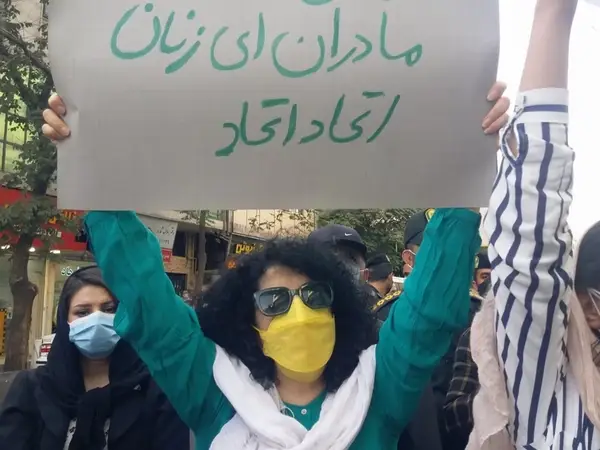The Nobel Committee has called on Tehran to give medical help to this year's Nobel Peace Prize laureate Narges Mohammadi, on hunger strike in Tehran’s Evin prison.
The imprisoned activist has been on hunger strike since Monday in Evin Prison to protest the lack of medical attention for sick inmates and the jail withholding medical treatment from her because she refused to wear a mandatory head scarf for a hospital visit.
"The requirement that female inmates must wear a hijab in order to be hospitalized, is inhumane and morally unacceptable," the Norwegian Committee said on Monday.
According to a statement released on her Instagram page by Mohammadi's family, she is protesting against what they describe as "the Islamic Republic's policy of procrastination and lack of medical care for the health and lives of prisoners" and "the policy of either death or compulsory hijab for Iranian women."
The women's rights advocate won the award on October 6 in a rebuke to Tehran's theocratic leaders, who accused the Nobel committee of meddling and politicizing the issue of human rights.
The US-based Human Rights Activists News Agency (HRANA) said authorities had not let the 51-year-old go to hospital for heart and lung treatment last week because she had refused to wear a mandatory head scarf for the visit. "This deprivation continues under the order of the prison authorities," HRANA added.
Mohammadi's family, expressing their concerns about her health and physical condition, stated in their announcement that she has needed urgent transfer to a heart and lung center for a week, but after Narges's follow-ups from prison and her lawyer's requests to judicial authorities, the prosecutor has opposed her transfer and refuses to issue the transfer permit.
On October 30, Mohammadi was denied access to proper medical care and a transfer to a hospital for the second time due to her refusal to wear a hijab. Following that, on October 30 and 31, she and some of her fellow inmates staged a sit-in protest in the courtyard of Evin Prison.
"She is willing to risk her life by not wearing the 'forced hijab' even for medical treatment," said a November 1 statement, written before Monday's announcement of the Nobel laureate's hunger strike.
Mahsa Amini, a young woman who was physically assaulted for not wearing compulsory hijab and was killed in a police station in September 2022, and the tragic death of Armita Geravand, a schoolgirl who was subjected to violence by hijab enforcers in the metro and died after 28 days in intensive care, are among the most well-known victims of the compulsory hijab policy of the Islamic Republic.
In recent years, many political prisoners, including Sasan Niknafs, a civil activist, Behnam Mahjoubi, a Gonabadi Dervish religious minority, Baktash Abtin, a poet and filmmaker, and Javad Rouhi, a protester sentenced to death, have lost their lives in prison. The Islamic Republic has not accepted any responsibility for their deaths, which were due to pressure, torture, and the denial of medical care.
In recent years, there have been numerous reports of the lack of medical care for political prisoners and the violation of their right to access proper healthcare by prison authorities in Iran.
According to the Nobel Committee, Mohammadi was recognized for her fight against injustice towards Iranian women and her efforts to promote human rights and freedom for all.
"We are concerned about Narges Mohammadi's physical condition and health," the Free Narges Mohammadi campaign wrote on X, formerly known as Twitter.
